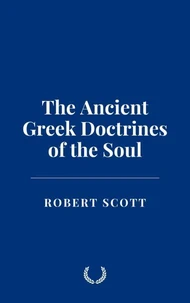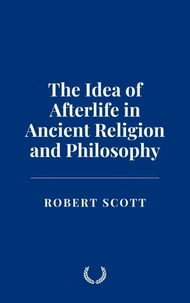Ancient Religion and the Greco-Roman Philosophers
Par :Formats :
Disponible dans votre compte client Decitre ou Furet du Nord dès validation de votre commande. Le format ePub est :
- Compatible avec une lecture sur My Vivlio (smartphone, tablette, ordinateur)
- Compatible avec une lecture sur liseuses Vivlio
- Pour les liseuses autres que Vivlio, vous devez utiliser le logiciel Adobe Digital Edition. Non compatible avec la lecture sur les liseuses Kindle, Remarkable et Sony
 , qui est-ce ?
, qui est-ce ?Notre partenaire de plateforme de lecture numérique où vous retrouverez l'ensemble de vos ebooks gratuitement
Pour en savoir plus sur nos ebooks, consultez notre aide en ligne ici
- FormatePub
- ISBN8230823186
- EAN9798230823186
- Date de parution04/02/2025
- Protection num.pas de protection
- Infos supplémentairesepub
- ÉditeurIndependently Published
Résumé
This book explores the intersection of religion and philosophy in ancient Greco-Roman thought, tracing the intellectual evolution from early mythological conceptions of the divine to the rise of philosophical systems that sought to rationalize and interpret religious beliefs. Beginning with the presocratic philosophers such as Heraclitus and Pythagoras, the text delves into the development of monistic, dualistic, and pantheistic views, examining key figures like Parmenides, Empedocles, and Socrates.
It further explores the theological contributions of Plato and Aristotle, who redefined the divine in terms of reason, unity, and rational order. The text also investigates the emergence of Hellenistic philosophical schools, particularly Stoicism and Epicureanism, which addressed the role of the divine in human affairs, as well as the skepticism that challenged the very possibility of knowledge about the gods.
As the Roman Empire expanded, the influence of mystery religions, Neoplatonism, and early Christian thought reshaped religious and philosophical discourse, culminating in the synthesis of Christian theology and Greco-Roman philosophy in figures like Augustine of Hippo.
It further explores the theological contributions of Plato and Aristotle, who redefined the divine in terms of reason, unity, and rational order. The text also investigates the emergence of Hellenistic philosophical schools, particularly Stoicism and Epicureanism, which addressed the role of the divine in human affairs, as well as the skepticism that challenged the very possibility of knowledge about the gods.
As the Roman Empire expanded, the influence of mystery religions, Neoplatonism, and early Christian thought reshaped religious and philosophical discourse, culminating in the synthesis of Christian theology and Greco-Roman philosophy in figures like Augustine of Hippo.
This book explores the intersection of religion and philosophy in ancient Greco-Roman thought, tracing the intellectual evolution from early mythological conceptions of the divine to the rise of philosophical systems that sought to rationalize and interpret religious beliefs. Beginning with the presocratic philosophers such as Heraclitus and Pythagoras, the text delves into the development of monistic, dualistic, and pantheistic views, examining key figures like Parmenides, Empedocles, and Socrates.
It further explores the theological contributions of Plato and Aristotle, who redefined the divine in terms of reason, unity, and rational order. The text also investigates the emergence of Hellenistic philosophical schools, particularly Stoicism and Epicureanism, which addressed the role of the divine in human affairs, as well as the skepticism that challenged the very possibility of knowledge about the gods.
As the Roman Empire expanded, the influence of mystery religions, Neoplatonism, and early Christian thought reshaped religious and philosophical discourse, culminating in the synthesis of Christian theology and Greco-Roman philosophy in figures like Augustine of Hippo.
It further explores the theological contributions of Plato and Aristotle, who redefined the divine in terms of reason, unity, and rational order. The text also investigates the emergence of Hellenistic philosophical schools, particularly Stoicism and Epicureanism, which addressed the role of the divine in human affairs, as well as the skepticism that challenged the very possibility of knowledge about the gods.
As the Roman Empire expanded, the influence of mystery religions, Neoplatonism, and early Christian thought reshaped religious and philosophical discourse, culminating in the synthesis of Christian theology and Greco-Roman philosophy in figures like Augustine of Hippo.






















